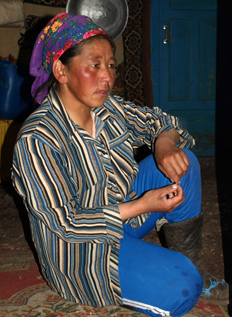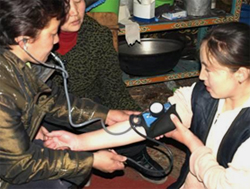News
Delivering Hope to Mongolian Herders Who Lost Livestock and Livelihoods During the Dzud
- 27 May 2010
News
UVS PROVINCE, Mongolia — Mongolia is still reeling last winter’s ‘dzud’ that sent temperatures plunging to – 40 degrees, and killed nearly more than 7.8 million animals, over 17 per cent of the country’s livestock. The dzud – a complex, natural disaster in which a summer drought is followed by heavy snowfalls and unusually low temperatures in winter, and then by a dangerous spring thaw – has destroyed the livelihoods of nearly 9,000 Mongolian families, who rely on their livestock for income, food and fuel.
Among those affected is Oyuna, a nomadic herdswoman with only a third grade education. She lives together with her daughter, son in-law and their newly born child in their ger (a round, transportable tent) far away from the district centre. Her other two children are attending secondary school and live in the dormitory far away.

The harsh winter conditions have isolated Oyuna’s family and strained its ability to keep food on the table and the children in school. “During the dzud, we lost more than two-thirds of our livestock,” said Oyuna. “There was nothing we could do to prevent it. I am very worried now about the future and even feel ashamed that this has happened.”
To assist women like Oyuna to rebuild their life and future, UNFPA, the United Nations Population Fund, the Ministry of Health and the National Centre for Mental Health from Ulaanbaatar, are providing psychosocial support and help women find information and resources they need to make a new start. In close cooperation with the Ministry of Social Welfare and Labour, livelihood support is provided to the most affected women, especially the female-headed households in the remote four western provinces of Mongolia.
It took the UNFPA-sponsored psychosocial support team more than an hour to find Oyuna’s ger behind the mountains in Turgen district, Uvs province. In an afternoon at Oyuna’s ger, they counselled her individually as well as in a group with family and community members. It was an intensive session, but the first signs of relief can be felt already.
‘I am very happy that the team came to see me and are helping me to deal with my situation,” said Oyuna. “I understand better now that it was not my fault, although I feel very responsible for the loss of the animals. Nevertheless, it is still hard for me to face the reality now. So, it will be good to have more support of this kind.’
Dr. Nasantsengel, Deputy Director of the National Centre for Mental Health, says that more counselling sessions will be scheduled for Oyuna. “Although we can’t help her to bring back the animals, we can help to increase her resilience and regain her psychological strength so that she will be able to move on focusing on the future.”
Once the acute stress of loss and grief is dealt with, the affected women and their families can start to rebuild their life and future. Assistance for schooling costs, vocational training, business start ups, vegetable growing and herding techniques is available through the year-long programme, which is funded by the Australian Government. ‘I look forward to expanding my skills and learn how I can make me and my family more resistant to shocks like the dzud,” Oyuna said.
Since the Government of Mongolia requested emergency assistance in January, UNFPA has spent more than $600,000 on outreach to isolated

populations. This includes essential reproductive health packages including medicines, midwifery kits for provincial hospitals, clinical delivery kits for smaller hospitals, nutritional supplements for pregnant women and lactating mothers and warm clothes, especially boots. UNFPA has received funding from the Central Emergency Relief Fund and is part of the Consolidated Appeal Process that the UN launched on May 12th. The Appeal seeks more than $18 million to address the humanitarian, early recovery and disaster preparedness needs of Mongolia.
— Francine Egberts